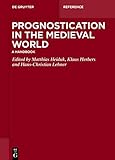Prognostication in the Medieval World : A Handbook / ed. by Klaus Herbers, Matthias Heiduk, Hans-Christian Lehner.
Material type: TextSeries: De Gruyter ReferencePublisher: Berlin ; Boston : De Gruyter, [2020]Copyright date: ©2021Description: 1 online resource (XII, 1027 p.)Content type:
TextSeries: De Gruyter ReferencePublisher: Berlin ; Boston : De Gruyter, [2020]Copyright date: ©2021Description: 1 online resource (XII, 1027 p.)Content type: - 9783110501209
- 9783110498479
- 9783110499773
- online - DeGruyter
- Issued also in print.
| Item type | Current library | Call number | URL | Status | Notes | Barcode | |
|---|---|---|---|---|---|---|---|
 eBook
eBook
|
Biblioteca "Angelicum" Pont. Univ. S.Tommaso d'Aquino Nuvola online | online - DeGruyter (Browse shelf(Opens below)) | Online access | Not for loan (Accesso limitato) | Accesso per gli utenti autorizzati / Access for authorized users | (dgr)9783110499773 |
Browsing Biblioteca "Angelicum" Pont. Univ. S.Tommaso d'Aquino shelves, Shelving location: Nuvola online Close shelf browser (Hides shelf browser)

|

|

|

|

|

|

|
||
| online - DeGruyter Another Road to Damascus : An Integrative Approach to 'Abd al-Qadir al-Jaza'iri (1808-1883) / | online - DeGruyter Hittite Etymological Dictionary. Volume 10, Words beginning with SA / | online - DeGruyter Praxishandbuch Prozessmanagement in Bibliotheken und Informations- einrichtungen / | online - DeGruyter Prognostication in the Medieval World : A Handbook / | online - DeGruyter Konstruierte (Fremd-?)Bilder : Das östliche Europa im Diskurs des 18. Jahrhunderts / | online - DeGruyter Prozessmanagement und Process-Mining : Grundlagen / | online - DeGruyter Angewandte Tourismusgeografie : Räumliche Effekte und Methoden / |
restricted access online access with authorization star
http://purl.org/coar/access_right/c_16ec
Two opposing views of the future in the Middle Ages dominate recent historical scholarship. According to one opinion, medieval societies were expecting the near end of the world and therefore had no concept of the future. According to the other opinion, the expectation of the near end created a drive to change the world for the better and thus for innovation. Close inspection of the history of prognostication reveals the continuous attempts and multifold methods to recognize and interpret God's will, the prodigies of nature, and the patterns of time. That proves, on the one hand, the constant human uncertainty facing the contingencies of the future. On the other hand, it demonstrates the firm believe during the Middle Ages in a future which could be shaped and even manipulated. The handbook provides the first overview of current historical research on medieval prognostication. It considers the entangled influences and transmissions between Christian, Jewish, Islamic, and non-monotheistic societies during the period from a wide range of perspectives. An international team of 63 renowned authors from about a dozen different academic disciplines contributed to this comprehensive overview.
Issued also in print.
Mode of access: Internet via World Wide Web.
In English.
Description based on online resource; title from PDF title page (publisher's Web site, viewed 01. Nov 2023)


